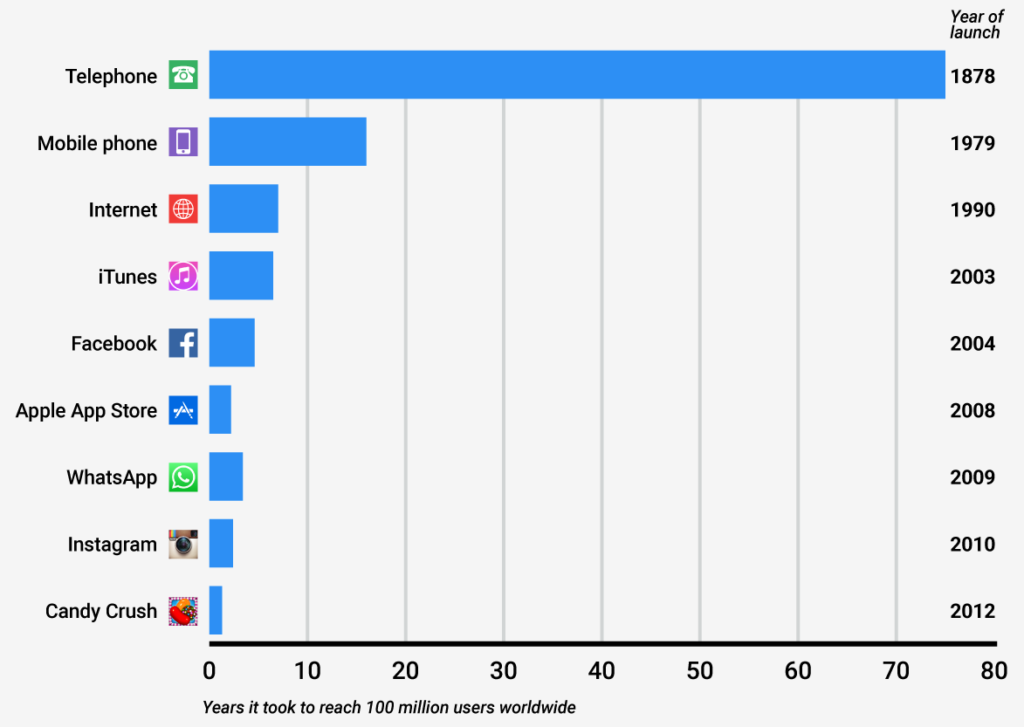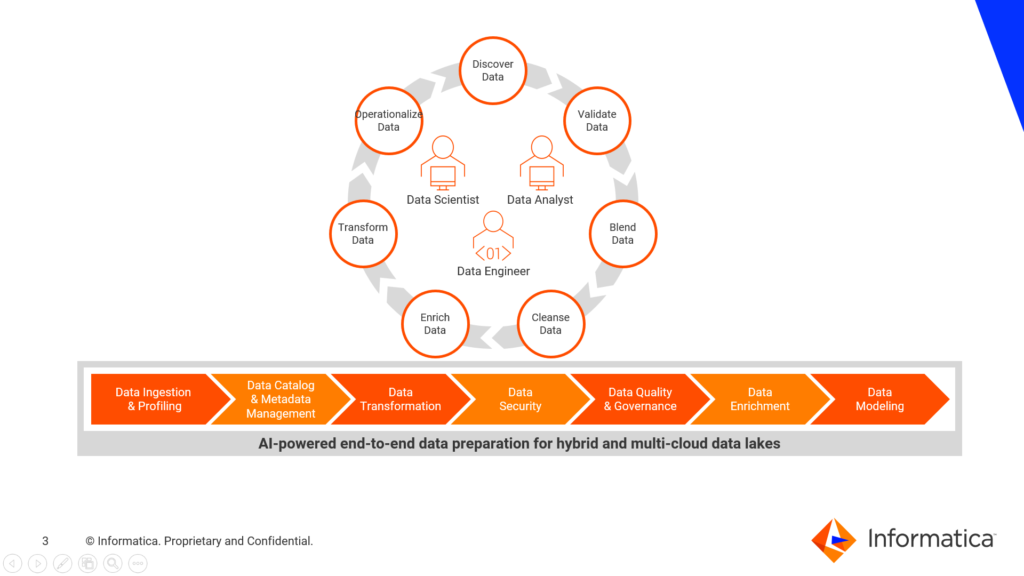8 Ways Data Preparation Helps to Meet the Data Needs of Self-Service Business Users

What does data preparation have to do with the history of the telephone? It took 75 years for the telephone to reach 100 million users (Source). Now, guess how much time it took Facebook, Instagram, and Candy Crush to reach 100 million users. The answer is four years, two years, and less than one year, respectively. Since the introduction of the internet, technology has changed significantly, and the rate of change has accelerated. At the same time, data has become central to how organizations do business. In 2019, four of the top five companies by market cap were technology companies. These data-centric companies are using data as an asset within their organizations. But when it comes to data preparation, some companies still act like they’re in the telephone phase of the technology curve.

What is data preparation and why does it matter?
According to IDC, data will grow to 175 zettabytes by 2025, and there will be countless users that will be performing data preparation. Everyone from the line of business to analysts is doing self-service analytics. We have more people analyzing and preparing data all the time—for use cases from analytics to operational reporting. The data preparation process includes steps to turn raw data collected from various sources into valuable data assets and insights. After raw data is ingested from multiple sources, data preparation processes refine the data by cleansing, joining, masking, applying data quality rules and publishing it in the curated zone of cloud data lakes for analytics consumption. But the variety of tools, users, and use cases can make it challenging for companies to choose the right tool for data preparation. And to add to that, everyone wants fast data today.
Data preparation is the catalyst for business value
Business users, applications, and AI programs depend on data preparation processes. TDWI research shows that 74% of organizations surveyed say that it is essential to reduce the amount of time and resources spent on getting the data ready for analytics consumption. Instead of spending time preparing their data, users could spend more time in essential activities. Here are eight ways that enterprise data preparation solutions from Informatica help self-service business users.

Eight ways data preparation helps meet data needs
1. Increase trust by improving data quality: Lack of data quality affects data governance and regulatory concerns. Poor data quality also negatively impacts data transformation, analytics, and visualization—and can lead to poor decision making. It is essential to get to data quality issues early. Enterprise data preparation ensures that data quality issues don’t proliferate downstream.
Informatica’s Enterprise Data Preparation, powered by CLAIRE, the industry’s first metadata-driven AI engine, applies AI and automation to improve data quality and reduce manual work. It helps enhance the standardization of data quality across the enterprise so you can maximize data value.
2. Establish an enterprise data catalog: An essential part of enterprise data preparation is data cataloging. An enterprise data catalog helps you discover and understand all your enterprise data. This is especially important as data is coming from different sources, including unstructured, semi-structured, images, videos, JSON files, or traditional sources, and it is stored in multi-cloud such as AWS, Azure, or Google Cloud.
Informatica Enterprise Data Catalog enables organizations to understand what data they have, how the data is defined, its location, lineage information about its origin and use, and how the data is related to other data. Using AI/ML and automation capabilities of CLAIRE engine, Informatica Enterprise Data Catalog can help organizations curate data for pipelines by exposing which datasets are available. This reduces the time it typically takes for users to find trusted, relevant, and available data.
3. Increase user agility and efficiency: TDWI research shows that more than 89% of those surveyed report that self-service reduces IT dependency. However, self-service can have downsides. Most users do not have adequate tools for preparing data. They are still using Excel, desktop databases, and primitive open source tools, creating consistency and quality issues. The data scientist and data analyst spend more than 60% of their time in preparing the data rather than analyzing it. This can slow down productivity and satisfaction among users.
Informatica Enterprise Data Preparation empowers the IT department to offer self-service capabilities on their data assets, while in turn enabling data analysts to discover the right data asset, prepare, apply data quality rules, collaborate with others, and deliver business value in significantly lesser time.
4. Improve analytics and data science: Data scientists and data analysts spend most of their time on data discovery and preparation instead of analytics and AI/ML development. They need technologies that can support highly interactive, fine-grained, and multivariate data analysis to develop models and discover patterns, correlations, and data relationships.
Informatica Enterprise Data Preparation provides intelligent and automated data preparation that helps data scientists and data analysts increase their productivity and focus on analytics, AI/ML, and achieve business outcomes. It can help reduce dependency on manual coding skills and reduce pressure on organizations to hire data scientists.
5. Increase the value of cloud data lakes: To make data available for advanced analytics and AI/ML workloads, organizations are modernizing on-premises data lakes in the cloud or establishing a new cloud data lake. But you still need data quality, data integration, and metadata management to ensure your cloud data lake doesn’t turn into a data swamp.
Informatica Enterprise Data Preparation shortens the path to value for cloud data lakes. It helps in transforming, cleansing, preparing, and enriching raw data once it lands into a cloud data lake and makes it ready for advanced analytics and AI/ML use cases. Informatica Enterprise Data Catalog tags the information that describes their data lineage. Cataloging of the data in scale increases consistency across all the data, which is not possible with siloed self-service tools.
6. Enhance operationalization with DataOps: Organizations are implementing DataOps methods to expand their agile experience to get faster deliverables, iterate in real time, and improve collaboration in their teams. DataOps blends aspects of Agile and DevOps methodologies to give organizations a framework for collaboration that reduces latency in constructing high-quality data pipelines at scale. DataOps can help you operationalize and accelerate processes for cleansing, profiling, enriching, and transforming data.
Scalable, AI-powered data preparation from Informatica can help you to achieve the following DataOps goals:
- Continuous integration and collaboration to quickly find relevant data
- Continuous delivery and easily mapped governed, trusted datasets to define business terms for increasing speed and quality of data pipelines
- Continuous deployment of datasets for pipelines
7. Gain a holistic view to streamline data prep: In many organizations, data preparation is often a hodgepodge of uncoordinated tools and processes. TDWI research finds that departmental self-service data prep solutions lack visibility into how processes such as transformations depend on each other. This can lead to interruptions, bottlenecks, performance problems, and redundancy.
Informatica Enterprise Data Preparation enables organizations to get an end-to-end holistic view of workloads to see common recurring problems and use AI and automation to replace unnecessary manual work.
8. Improve data governance: Organizations face significant pressure to protect sensitive data, adhere to data privacy regulations, and improve data trust. The governance rules, policies, and constraints cannot be applied in siloed self-service data preparation tools. These tools creates “shadow IT” silos, including data lakes that are not well-governed.
With Informatica’s Enterprise Data Preparation and Data Catalog, customers can establish governance while ingesting data into a data cloud data lake. Infusing CLAIRE, the industry’s first metadata-driven AI engine in a data catalog, can increase scalability and accuracy to protect data across cloud data lakes and data warehouses.
An end-to-end modern enterprise data preparation solution is essential to drive faster time to value with data. Informatica Enterprise Data Preparation can support all the above data prep requirements. It can discover all the data that is in a data lake or anywhere in the enterprise, prepare the data, apply data quality rules, mask the data for privacy, and operationalize data prep pipelines to drive AI and analytics.
Learn more
- Download the new TDWI Checklist Report - Accelerating Time to Value with Enterprise Data Preparation.
- Watch the TDWI on-demand webinar: Accelerate Time to Value with Enterprise Data Preparation








